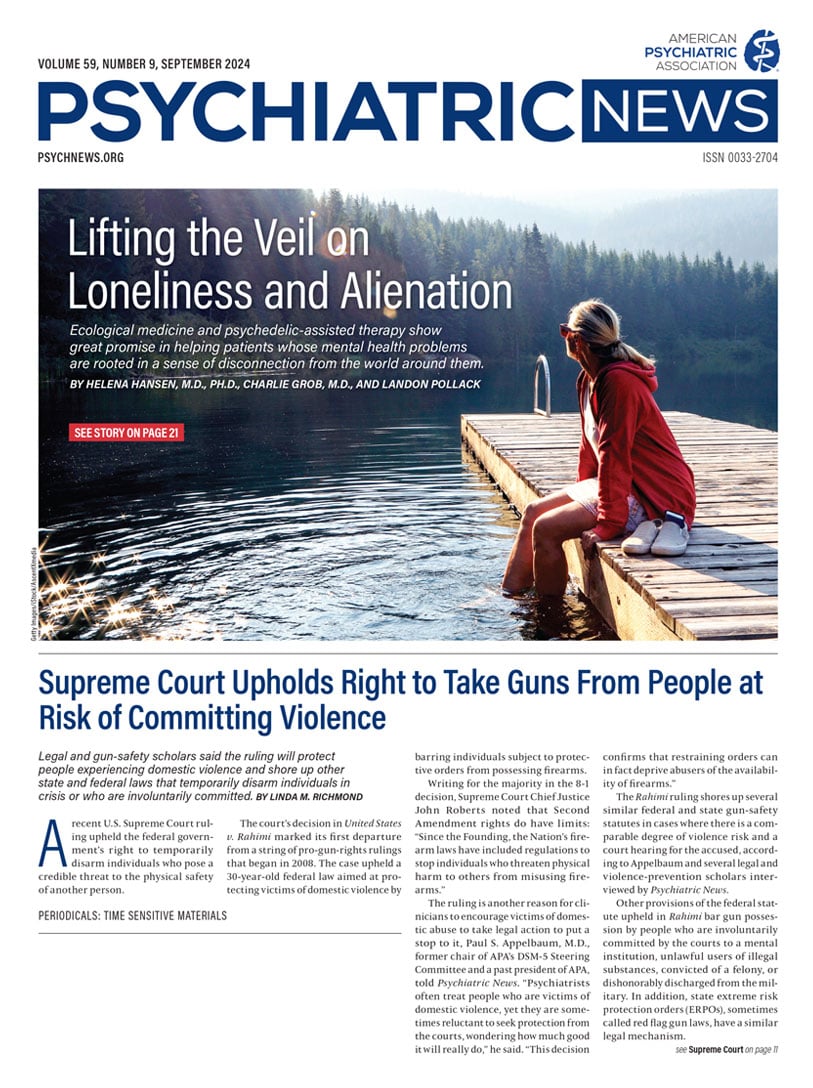A recent U.S. Supreme Court ruling upheld the federal government’s right to temporarily disarm individuals who pose a credible threat to the physical safety of another person.
The court’s decision in United States v. Rahimi marked its first departure from a string of pro-gun-rights rulings that began in 2008. The case upheld a 30-year-old federal law aimed at protecting victims of domestic violence by barring individuals subject to protective orders from possessing firearms.
Writing for the majority in the 8-1 decision, Supreme Court Chief Justice John Roberts noted that Second Amendment rights do have limits: “Since the Founding, the Nation’s firearm laws have included regulations to stop individuals who threaten physical harm to others from misusing firearms.”
The ruling is another reason for clinicians to encourage victims of domestic abuse to take legal action to put a stop to it, Paul S. Appelbaum, M.D., former chair of APA’s DSM-5 Steering Committee and a past president of APA, told Psychiatric News. “Psychiatrists often treat people who are victims of domestic violence, yet they are sometimes reluctant to seek protection from the courts, wondering how much good it will really do,” he said. “This decision confirms that restraining orders can in fact deprive abusers of the availability of firearms.”
The Rahimi ruling shores up several similar federal and state gun-safety statutes in cases where there is a comparable degree of violence risk and a court hearing for the accused, according to Appelbaum and several legal and violence-prevention scholars interviewed by Psychiatric News.
Other provisions of the federal statute upheld in Rahimi bar gun possession by people who are involuntarily committed by the courts to a mental institution, unlawful users of illegal substances, convicted of a felony, or dishonorably discharged from the military. In addition, state extreme risk protection orders (ERPOs), sometimes called red flag gun laws, have a similar legal mechanism.
“The Rahimi decision is reassuring to those of us who are concerned that the government is not stripped of all of its powers to limit gun possession,” said Appelbaum, the Dollard Professor of Psychiatry, Medicine, and Law and director of the Center for Law, Ethics, and Psychiatry at Columbia University.
Just one week after the ruling was handed down, the U.S. surgeon general declared gun violence a public health crisis, driven by the fast-growing number of injuries and deaths involving firearms. More than 48,000 people were killed by firearms in the United States in 2022, the majority from suicide (56%) and 40% from homicide. There has been a 41% increase in total U.S. firearm deaths per capita since 2010.
Background on Rahimi
The Supreme Court case centered on Zackey Rahimi, a small-time Texas drug dealer, who assaulted his then-girlfriend in a parking lot in December 2019. Rahimi fired a gun as she fled the scene, and he later called and threatened to shoot her if she reported the incident. In February 2020, the woman obtained a restraining order against Rahimi, barring him from contacting her or possessing a firearm for two years. Rahimi agreed to the order and did not contest the woman’s testimony, but was later arrested for showing up at her house. In November of that same year, Rahimi was charged with aggravated assault with a deadly weapon after he threatened a different woman with a gun. After his release, Rahimi was allegedly involved in five additional shootings. He was charged and convicted in federal district court under Section 922(g)(8) of the U.S. Code for possessing a firearm while subject to a domestic violence restraining order. He appealed to the Fifth Circuit on the grounds that the law was unconstitutional and violated his Second Amendment right to bear arms.
Impact on Gun Restrictions
What impact might the Rahimi ruling have on ERPOs and other state laws that allow courts to temporarily disarm individuals who are at imminent risk of doing violence to themselves or others? ERPOs were designed using the same legal principles as the domestic violence protective orders at the heart of the Rahimi case, according to Kelly Roskam, J.D., director of law and policy at the Johns Hopkins Center for Gun Violence Solutions.
“Rahimi put to rest what had been percolating in some of the courts—this possible distinction between firearm restrictions that are based on criminal convictions and those that were based on civil actions, like civil protective orders,” Roskam said. “Rahimi is very good news for [ERPOs],” which have faced legal challenges. “Based on the Supreme Court’s analysis for Rahimi, it’s not clear how the analysis for ERPOs would be much different.”
While Roskam is relieved by the ruling, she said the lower courts nonetheless failed victims and survivors. “The constitutionality of the firearm prohibition against individuals subject to domestic violence protective orders should never have been in question.”
Supreme Court Course-Corrects
The Rahimi decision represents a scaling back of New York State Rifle & Pistol Assn. Inc. v. Bruen, a 2022 Supreme Court ruling that invalidated a 100-year-old New York licensing law for concealed-carry permits. In that decision, the Supreme Court established a constitutional right to carry a loaded handgun for self-defense and created a new rule for how state and federal courts should interpret other laws affecting Second Amendment rights, finding that they must be consistent with “the nation’s historical tradition of firearm regulation.”
Almost immediately after the Bruen decision, there was an unprecedented number of challenges to firearm-safety laws in courts that were sympathetic to Second Amendment rights, according to Jack Rozel, M.D., M.S.L., medical director of Resolve Crisis Services of UPMC Western Psychiatric Hospital and psychiatry professor and adjunct law professor at the University of Pittsburgh.
In light of the Bruen ruling, the Fifth Circuit found in 2023 that disarming people subject to domestic violence protective orders—including Zackey Rahimi—was a violation of their Second Amendment rights because it didn’t fit within the nation’s historical tradition of gun regulation. The Fifth Circuit also raised concerns about what actions governments can take to legally address gun violence.
“To some extent, Rahimi eases those fears,” Appelbaum said. “In Rahimi, the majority of the court backs away from the more extreme implications of the Bruen decision and takes a broader perspective on what constitutes a historical tradition of gun regulation.”
In a statement, Katie Ray-Jones, CEO of the National Domestic Violence Hotline, said that her organization was relieved by the Rahimi decision. She noted that calls to the hotline had spiked after last year’s Fifth Circuit decision to invalidate the gun restrictions associated with domestic violence protective orders. “Just in the span of this case, we’ve witnessed an overwhelming number of stories and headlines about people who’ve lost their lives because their protection orders were denied or not enforced effectively,” Ray-Jones said. “We must do better.
“Prohibiting domestic violence abusers from accessing firearms is common-sense, life-saving, and constitutional…,” Ray-Jones added. “Our work to protect survivors is not done, and the fact that any of this was up for debate tells us how far we have to go.” ■
Resources
ERPO laws by state


